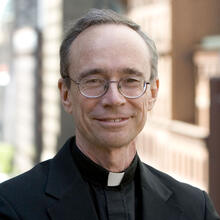The death of cardinal John O’Connor of New York on May 3 marks the end of an era in the American Catholic Church. Without question, he was the most powerful American cardinal of his generation. New York makes a bully pulpit for any archbishop with talent and chutzpah, and Cardinal O’Connor had lots of both. He was never afraid to speak out, even when it might upset powerful people and groups. He was liked by most New Yorkers, who respect a man who says what he thinks, even if they disagree.
Cardinal O’Connor was the de facto spokesperson for the church in the United States, although he was never the president of the National Conference of Catholic Bishops, the elected leader of the American bishops. In the media capital of the world, O’Connor was never shy about expressing his views, whether from the pulpit, through his regular column in Catholic New York, in press conferences or when approached on the street by reporters looking for a quote. Speaking out got him into trouble, and he readily admitted that sometimes he should have kept quiet. For the press, he was a refreshing change from bishops who never return phone calls or whose normal response is no comment.
Although often labeled as conservative in the media because of his opposition to abortion, the cardinal was to the left of most liberal Democrats when it came to concern for the poor. He opened Catholic hospitals to AIDS patients, took on Mayor Giuliani for New York’s treatment of the homeless and refused to cross picket lines. One reporter recalled overhearing him shout on the phone, There will be no scabs working at Catholic hospitals as long as I am archbishop.
John O’Connor was one of the first archbishops I interviewed for my book, Archbishop: Inside the Power Structure of the American Catholic Church. He was very different from his predecessor, Cardinal Terrence Cooke. Cooke grew up in New York and spent all his priestly life in the archdiocese, where he had been at various times in charge of finances, Catholic Charities and priest personnel and had served as Cardinal Spellman’s secretary. He was the consummate administrator who knew the archdiocese inside and out.
O’Connor, on the other hand, knew little about New York when he arrived and wisely delegated administrative tasks to others so he would have time for his public role. He rarely interfered with how a pastor ran his parish.
Instead of micromanaging his archdiocese, O’Connor devoted his time to his role as a city, national and international leader. He studied Spanish so he could communicate better with his flock. He reached out to the Jewish community, which came to recognize him as a true friend. He became a power to be reckoned with in the N.C.C.B. His amendments almost always were adopted on the floor. Wise episcopal chairmen consulted with him before their documents went to the other bishops.
The cardinal’s closeness to Pope John Paul II enhanced his position in the United States and in the Vatican. They were kindred spirits on substance and style. Whenever he visited Rome, the pope’s door was open. As a member of the Vatican’s Congregation for Bishops, the cardinal had a strong say in episcopal appointments in the United States.
Nor was he afraid to speak the truth to the pope behind closed doors. When the papal commission studying the crisis in Seattle went to give their report, before Cardinal Bernardin and Archbishop Quinn could even sit down, O’Connor told the pope, Well, you are just going to have to admit you made a mistake sending Wuerl to Seattle. The pope would accept such blunt talk because he knew he could trust and rely on O’Connor.
Cardinal O’Connor wanted to be remembered as a good priest, and that he was. He will be a hard act to follow.







